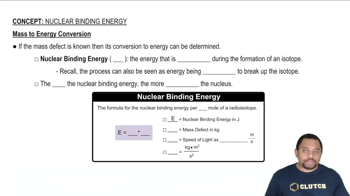Textbook Question
The radioactive isotope 100Tc decays to form the stable iso-tope 100Mo. (a) There are two possible pathways for this decay. Write balanced equations for both.
361
views
 Verified step by step guidance
Verified step by step guidance



The radioactive isotope 100Tc decays to form the stable iso-tope 100Mo. (a) There are two possible pathways for this decay. Write balanced equations for both.
The radioactive isotope 100Tc decays to form the stable iso-tope 100Mo. (b) Only one of the pathways is observed. Calculate the energy released by both pathways, and explain why only one is observed. Relevant masses are: 100Tc = 99.907 657, 100Mo = 99.907 48, electron = 0.000 548 6.